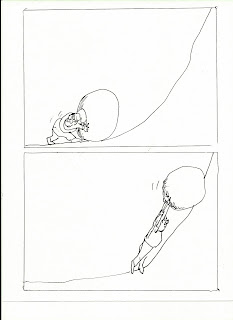
Universal Health Care for the USA
I like President Obama, and for me he is a huge improvement over George W. That does not mean I agree with Mr. Obama on everything. Actually, I am surprised to find that I agree with Mr. Obama on almost nothing. I am a committed liberal, an obsessed progressive, and, (I know this is going to shock the Tea-Bag Birther Death Panel Republicans) Mr. Obama is a moderate. Barack Obama is a centrist.
I find myself in an odd situation. I am a fierce advocate for health reform, and I want Mr. Obama to win on health reform. At the same time, I don’t want the health reform that seems to be coming our way. It appears that the health reform that might pass will be a mandate for citizens to buy health insurance. That is government forcing almost everyone to buy health insurance, and that is not government providing health care for everyone.
What seems to be coming our way is a boondoggle benefiting the health insurance industry. There is a claim that there will be government assistance for people who can’t afford to buy health insurance, but who trusts that the assistance will be adequate? Bureaucrats develop regulations, they have a chart, and they look at income, calculate what you can afford, look over the rim of their glasses and say, “According to this chart you can afford $200 a month. On paper it may look like you can afford to pay $200 a month but you also know that another $200 a month bill is going to pull you under financially.
I would worry about this, but I’m told it will take up to 10 years for the full effect of the health reform legislation to kick in. I fear that as soon as Tea Baggers take over the Congress and/or the White House there will a frantic mêlée to dismantle Obama’s Health Reform.
I voted for Obama, and I like Obama. I never expected I would agree with Obama on everything. This may shock the Tea-bagger, Death Squad, Birthers, but in my eyes Obama is a centrist, a middle of the road moderate Democrat.
I’m so progressive (so Liberal) that the President I could agree with wholeheartedly is and may always be, unelectable. I find myself in the odd position of wanting Obama to succeed with health reform, and not wanting Obama to succeed. I have grave reservations about what is heading for passage. I want to translate my reservations into words, but I am not in the least expecting real, meaningful health care has a snowballs chance of surviving a July day in Presidio, Texas.
When American’s say, “Our nation can’t afford Universal (single payer) health care,” they are either ignorant, or lying. We can afford to pay for what we are motivated to pay for. There is plenty of money coming in to pay for National Health Care IF our citizens wanted it.
The United Stated could afford National Health Care by: cutting spending in other areas, or raising taxes, or borrowing money. Those opposed to universal health care object to raising taxes, and increasing the national debt. They may agree to cut spending, but not to use the money elsewhere, but to give it back to the richest of our citizens. See the point? The ability to pay for single payer national health care exists, but the objectors are unwilling to do what would have to be done to fund it.
Let us just be honest. When people say, “We can’t afford National Health Care for all,” what they mean is that we can afford it, but we are choosing not to pay that cost.
Why not? Why don’t the majority of us support health care for all? Here are some of the reasons.
Many Americans feel that health care is not a basic human right, it is a privilege that goes to those who are lucky enough to afford it. This is the one and only reason that we do not have access to health care available to all our people.
Being a wild-eyed Liberal, I disagree with this position, of course. Most of the world, including (officially at least) the United States, agree that access to health care IS a basic Human Right. In 1948 the United Nations adopted something called The Universal Declaration of Human Rights. The Universal Declaration of Human Rights proclaimed that “everyone has the right to a standard of living adequate for the health and well-being of oneself and one’s family, including food, clothing, housing, and medical care.”
The United States has veto power in the United Nations and did not veto this Declaration.
Having a fancy car is not a universal right, it is a privilege you can have if you can afford to buy a fancy car. Having soda pop is not a universal right, but access to drinking water is (or should be).
Now obviously there are human rights that exist and millions of humans living without those rights. We might agree that if a human exists they have a basic human right to inhale. Maybe you would agree that a human has a right NOT to be raped, NOT to be a slave, Not to be murdered. Most would agree that a human (just because they exist) has the right to think what they want to think, and worship the way they want to worship. These may be rights, but there are still many humans that are raped, enslaved, and murdered. There are humans who are punished, imprisoned, and executed because of how they think. There are humans who are punished, imprisoned, and executed because of how they worship.
I believe that access to real health care is a human right. There are poor countries that can’t afford to ensure that their citizens have that right, but the United States isn’t one of them. The top 10% percent of our tax payers control 71% of the entire wealth of the world. This is still a rich nation, and this nation could afford single payer universal health care if they wanted to – they just do not want to.







